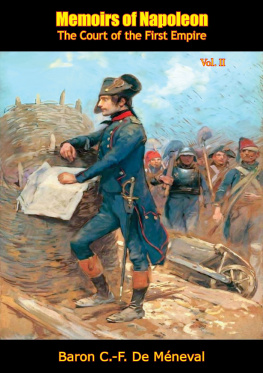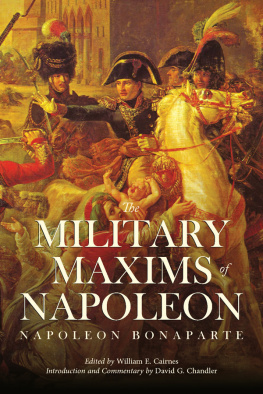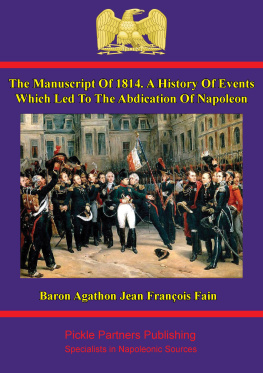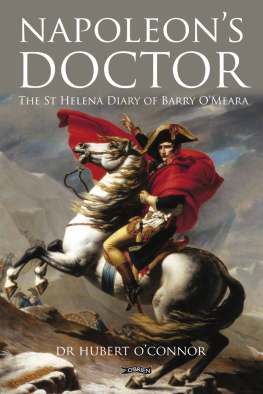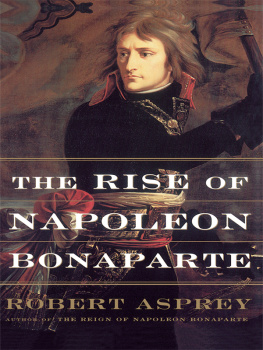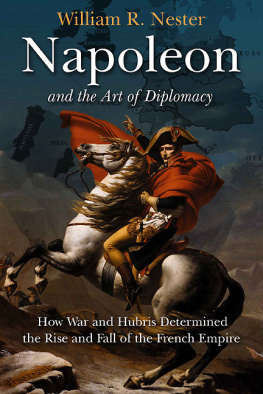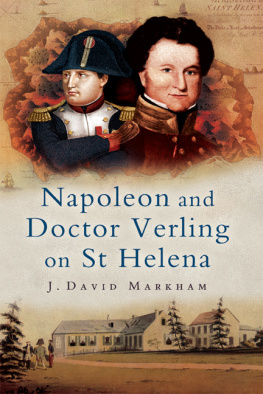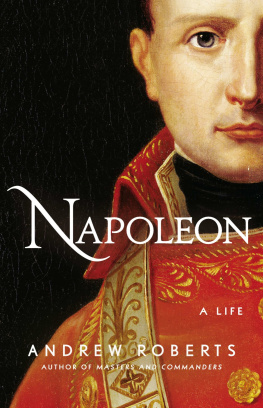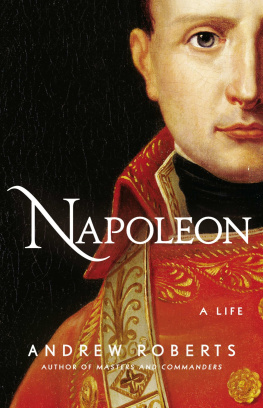

This edition is published by FRIEDLAND BOOKS www.pp-publishing.com
To join our mailing list for new titles or for issues with our books friedlandbooks@gmail.com
Or on Facebook
Text originally published in 1910 under the same title.
Friedland Books 2017, all rights reserved. No part of this publication may be reproduced, stored in a retrieval system or transmitted by any means, electrical, mechanical or otherwise without the written permission of the copyright holder.
Publishers Note
Although in most cases we have retained the Authors original spelling and grammar to authentically reproduce the work of the Author and the original intent of such material, some additional notes and clarifications have been added for the modern readers benefit.
We have also made every effort to include all maps and illustrations of the original edition the limitations of formatting do not allow of including larger maps, we will upload as many of these maps as possible.
MEMOIRS OF NAPOLEON BONAPARTE.
The Court of the First Empire
BY BARON C-F DE MNEVAL
His Private Secretary
VOLUME II
With a Special Introduction and Illustrations
TABLE OF CONTENTS
Contents
LIST OF ILLUSTRATIONS
VOLUME I
THE DEATH OF THE DUC DENGHIEN from the painting by Jean Paul Laurens
THE YOUNG NAPOLEON AT SCHOOL AT BRIENNE from the painting by M. Realier Dumas
THE CAPTURE OF THE AUSTRIAN FLAG AT AUSTERLITZ from the aquarelle by Adolphe Lalauze
VOLUME II
THE CIVIL MARRIAGE BETWEEN PRINCE JEROME AND PRINCESS CATHARINE, IN THE TUILERIES PALACE from the painting by J. B. Regnault
MARSHAL JOACHIM MURAT LEADING THE CHARGE AT JENA from the painting by H. Chartier
THE WOMEN AND MONKS DISTINGUISHING THEMSELVES BY THEIR RESISTANCE AT SARAGOSSA from the painting by N. Megia
NAPOLEON WITH HIS INFANT SON, THE KING OF ROME, IN HIS LAP, SURROUNDED BY THE CHILDREN OF JOACHIM MURAT from the painting by Ducis, in the Museum at Versailles
PALM WAS ARRESTED, TRIED BY COURT MARTIAL, AND SHOT from the painting by J. Weiser
VOLUME III
NAPOLEON LEAVING RUSSIA WITH THE DUC DE VICENCE IN A SLEDGE from the painting by Jan von Chelminski
QUEEN MARIE LOUISE LEAVING PARIS WITH HER YOUNG SON THE KING OF ROME
NAPOLEON RECONNOITERING THE ENEMYS FORCES from the painting by Jan von Chelminski











MEMOIRS OF NAPOLEON I.
CHAPTER VI
Rupture with Prussia.The Emperor's Departure for the Army.Battles of Jena and Auerstdt.Annihilation of the Prussian Armies.Entry into Berlin.Entry of the French Army into Poland.Treaty with the King of Saxony.The Battle of Eylau.Battle of Ostrolenka.Second Winter-quarters at the Castle of Finckenstein.
I USED to take an hours horse exercise every day, as much for amusement as for the sake of exercise. I felt more than ever the need of some assistance, and I asked the Emperor to give me a companion. The idea then came to him to create two posts of Secretary to the Cabinet, and he appointed General Clarkewho, now that the death of the King of Etruria had closed his mission to this prince, was without employmentto one of these places. The Emperor appearing to neglect him, Clarke followed him step by step during his journey in Alsatia, placing himself before him each time that he had the opportunity of recalling himself to his memory. On his return from this short journey, the Emperor told me that, not wishing to interrupt the unity of the work of his private work-room, he had made up his mind to charge the general with the title of Secretary to the Cabinet, with a special class of work, viz., his correspondence with the Ministers of War and Marine; and that this would be a notable reduction of my days work. General Clarke was accordingly established in a private office. But the necessity of sending for him to write to his ministers often kept the Emperor back from making use of his services; in one word, the post degenerated into a sinecure. The second post of Secretary to the Cabinet was also vacant when the 1805 campaign took place. General Clarke, who followed the Emperor in this campaign with me, was appointed governor of Vienna. He was entrusted with several missions abroad after this campaign, and his post as Secretary to the Cabinet remained as unoccupied as the second post.
The assistance which it had been the Emperors intention to give me was accordingly only an illusory one. Another year passed without any change being made in the work in the cabinet. I repeated my application to Napoleon to obtain an assistant. What I needed above all was to be relieved of the care of the papers which had to be classified after having been answered. The multiplicity of my occupations prevented me from keeping these papers in sufficiently good order to be able to find any draft of a letter or a despatch which the Emperor might want to see at a moments notice. Napoleon avoided satisfying my request for some time longer, either by making promises which he did not keep, or on various pretexts. He used to urge me to get married, assuring me that he would arrange my work in such a manner that I should get some rest. Various matches were proposed to me by him and the Empress Josephine, including a lady who was one of her relations, and whom she obliged me to call upon at her house. But at that time I did not feel any vocation for marriage. Besides, I was determined that if I ever did make up my mind to get married I would choose my own wife. As a matter of fact, more than two years passed before I contracted the irrevocable bonds, the solemnity of which so impressed me. Seeing that the Emperor put off keeping his promise every day, I became discouraged and fell ill, as much from worry as from overwork. On hearing this news the Emperor showed his solicitude and sent me Doctor Corvisart, who was charged with a kind message. Pending my recovery he sent for the Empresss private secretary. M. Deschamps was one of our most agreeable vaudeville writers; he was still capable of more serious work, and lively and brisk, though past middle life. Napoleon despaired from the very first of being able to accustom him to his way of working, and especially to writing from his dictation. He employed General Duroc, the aide-de-camp on service, and the Secretary of State in turn. During my short illness I was to some extent in the position of the man who while yet alive reads an obituary notice of himself, written by some friendly pen at the news of his death. I heard that when the person to whom the Emperor was dictating did not take down his words sufficiently quickly the Emperor would cry out: I cannot repeat. You make me lose the thread of my thought. Where is Mneval? Pointing to the disorder on his writing-table he would cry out: If I had Mneval here, I should soon have cleared all that away. He also used to say that he was postponing all work of importance until after my recovery. As a matter of fact my entire merit consisted in the acquaintance I had with the connection and direction of Napoleons affairs, in the way that thanks to this knowledge I was able to foresee their development and issue, and in my familiarity with the connection of his ideas, with the precision of his style, and with the originality of his expressions. I did not know any kind of shorthand, and so would have been unable to take down the Emperors words literally; but I used to note down the principal points which served as memoranda and also the characteristic expressions. I used to rewrite the letters in almost the same terms as he had used, and when he read it over before signing it, which only happened when it was a delicate matter, or one which pre-occupied him, he used to find his own style in my writingif I may use that expression. Those who have followed the details of the work done in the imperial cabinet for sufficient time, or who made themselves acquainted with Napoleons method of work, have been in a position to verify the truth of what I have related.
Next page
